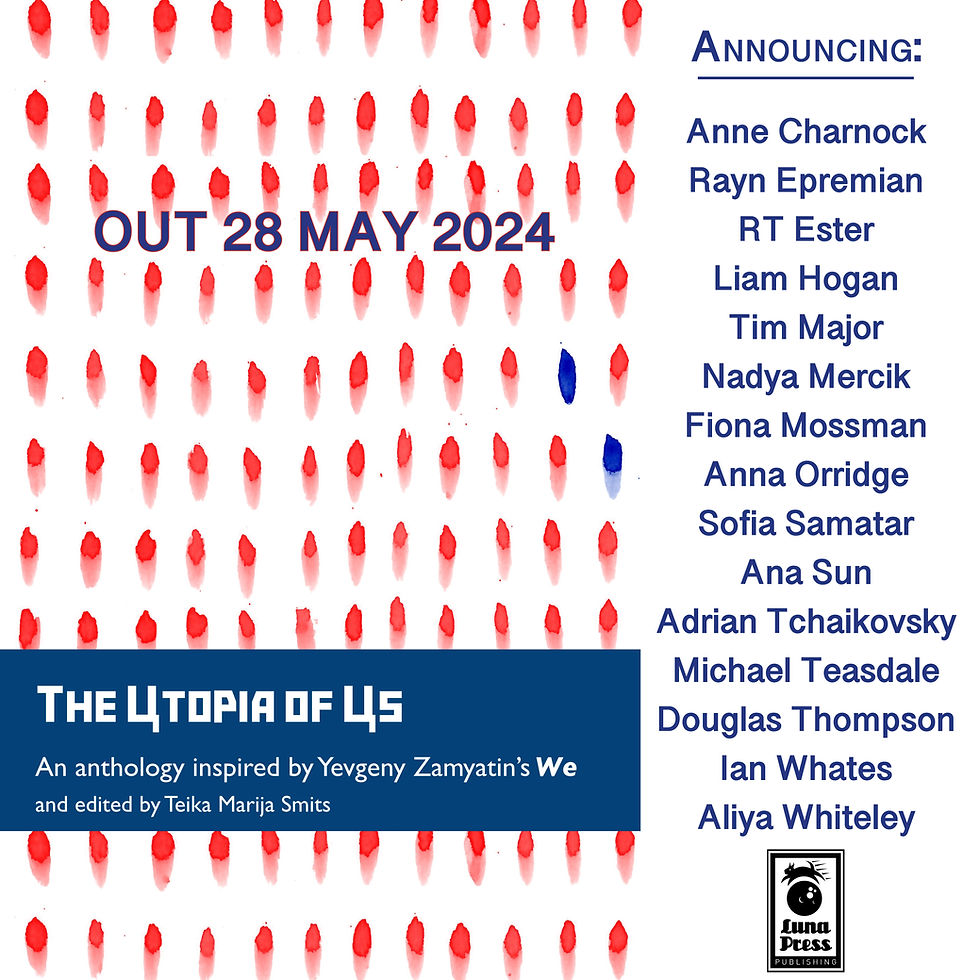
The Utopia of Us anthology is now available for pre-order! Editor Teika Marija Smits has brought together 15 incredible writers and their stories, directly inspired by We by Yevgeny Zamyatin.
It is a charity anthology, and given Russia's current war with Ukraine, royalties from the book will be donated to the Ukraine Humanitarian Appeal.
If you pre-order directly from the Luna website, you will also receive a discount. Check it out!
Today we'd like to introduce you to Ian Whates and the story "Education – The Final Ingredient – The Cost of Living".
About the author:
IAN WHATES is the author of ten published novels (two co-written), two novellas, and some eighty short stories, which have appeared in a variety of venues including Nightmare Magazine, Galaxy’s Edge, Daily Science Fiction, the science journal Nature and numerous anthologies.
In 2019 he received the Karl Edward Wagner Award from the British Fantasy Society, while his work has been shortlisted for the Philip K. Dick Award and on three occasions for BSFA Awards. He is a director and former chair of the British Science Fiction Association and has been a judge for both the Arthur C. Clarke Award and the World Fantasy Awards. He has edited more than 40 anthologies and is the editor of ParSec digital magazine for PS Publishing. In 2006 Ian founded multiple award-winning independent publisher NewCon Press by accident, and continues to be bemused by the fact that the Press has now published more than 200 titles.
Ian on the story:
I first read We in my teens, at a time when I was devouring SF by authors new to me at every turn. I recall being impressed by it as much as enjoying it, and subsequently could appreciate its importance: its influence on dystopian works such as Orwell’s 1984 and Huxley’s Brave New World.
I’ve wanted to write a story for a while now highlighting the worrying divide that has developed in the UK between ‘town’ and ‘country’. It’s by no means universal and such tensions are hardly new, but the divisions seem to have grown starker in this post-pandemic world, with so many urbanites disdainful of the countryside and dismissive of those who live there. That works both ways, of course, with plenty of rural folk happy to dismiss city dwellers with equal prejudice.
The opportunity to write for an anthology celebrating the centenary of Zamyatin’s seminal novel offered a framework for this as yet nebulous idea. The story would need to reflect rigid social order, a totalitarian state which relied on control of population and individual. I also wanted the narrative to be sharply focussed, almost claustrophobic in its setting, reflecting the restricted life of the protagonist and contrasting it with the greater freedoms of the visitors (the school children) for whom this is just one of many environments – somewhere they flit into and will soon leave again.
This gave me setting, some ingredients, and the spirit of a story, but not yet the substance of one. Then I saw the actor Timothée Chalamet interviewed on a TV chat show. He was the star of a newly released film Wonka, which provides backstory to the classic Willy Wonka and the Chocolate Factory. That gave me the ingredient I’d been searching for: a mental switch was flicked, connections were made, and suddenly I knew how to articulate the story.
We may have been published 100 years ago, and the world we know may be very different from the one the book portrays, but science fiction never has been about prediction; its purpose is to hold up a mirror to society and ask the question, “What if…?” In that regard, We remains as relevant today as it always has been.

More on the anthology:
The year 2024 marks the centenary of the first publication of We, the direct inspiration for George Orwell’s 1984, and many other novels, such as Ursula K. Le Guin’s The Dispossessed and Kurt Vonnegut’s Player Piano.
Strikingly, the Russian novel was first published in English, and in the US. Indeed, it wasn’t until 1988 that it was published in the author’s native country. Clearly, this was a book that the people in power in the Soviet Union wanted erased. Yet it ushered in a new genre – the future dystopia – and in doing so gave birth to the many dystopian novels and films which have found their way into our popular culture.
Setting aside what its publication history says about Russia’s past, it also happens to be a beautifully written and page-turning novel, and one that is still currently relevant since it speaks to the very heart of what it means to be human. In short, the centenary of this wonderful novel should be, and needs to be, celebrated, and how better to do that than by a globally minded, independent press, publishing an anthology of science fiction stories inspired by We?

Comentarios